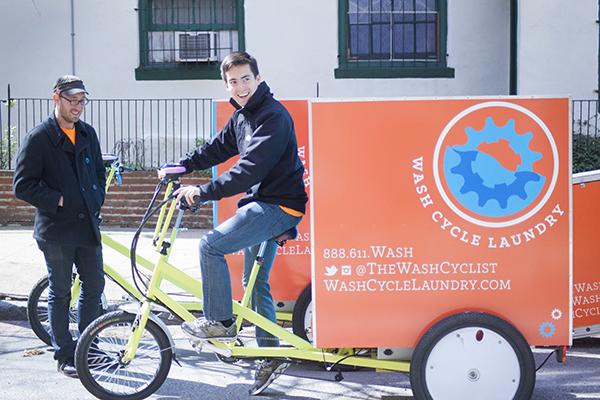A sustainable laundry service will soon be pedaling around campus to wash dirty laundry in the Science and Engineering Hall.
Wash Cycle Laundry, a Philadelphia-based operation with outlets in three major cities, has left cars and trucks behind in an effort to meet commercial and consumers’ laundry needs and deliver their goods by bicycle. The environmentally friendly company signed a contract with GW’s janitorial service provider, Aramark, last week, but is starting out small, servicing only the Science and Engineering Hall.
Gabriel Mandujano, the founder of the company, launched the service in 2010 and is just starting to work in D.C. GW is the first university the group will work for in the city, but the company has been working with schools like the University of Pennsylvania for years.
The company will wash janitorial materials including mopheads, microfiber cloths and towels.
Mandujano said he had reached out to other D.C. universities and hopes to expand to other colleges in the future, but GW was the first institution to respond to his offers.
“GW was the [university] that was most enthusiastic and ready to move the quickest in a really big way,” Mandujano said.
Mandujano said Wash Cycle Laundry will also target GW students for personalized laundry service starting in the fall. They will join the popular laundry service Soapy Joe’s, which washes clothes off-site for students for a fee. Each residence hall is also outfitted with washers and dryers that students can pay to use.
“We’re still trying to figure out how that might work,” Mandujano said. “We figure we’ve got the summer to figure that out.”
GW has prioritized becoming a more sustainable campus since University President Steven Knapp’s arrival in 2007, renovating 30 buildings to increase efficiency and creating a plan to reduce its carbon footprint by 40 percent by 2025.
Mandujano said he started his career working for nonprofits and figured out a way to translate his experiences into a new business.
“I had done work both in sustainability and community economic development,” he said. “I was eager to create a venture that could achieve both of those goals.”
About half of the company’s employees are made up of former substance abusers, convicted felons, homeless people and current citizens on welfare. He said his background working in economic development prompted him to reach out to those groups who may have more difficulty in finding employment.
And while Wash Cycle Laundry has no central laundry location, the group has created agreements with laundromats and other facilities in the area to allow its employees do the laundry there at a reduced rate, Mandujano said.
A press release added that the company’s employees are paid above minimum wage, and the agreement with the University has made the service double its employment in the District.
Wendy Coles, a cyclist in Philadelphia, said Wash Cycle Laundry has given her flexible hours and working alongside people from different backgrounds has given her a broader perspective.
“It’s a good company to work for even though it’s a startup,” Coles said. “You get to experience all different types of people.”
Elliot Rosario Jr. trains the cyclists who retrieve and deliver the laundry for the company. He said working at the company has been “rewarding” because of his love for cycling and his belief in the service’s social mission to give its employees “a chance towards upward mobility.”
“People who are skilled and get back into the workforce are very motivated individuals but have barriers,” Rosario said. “We seek to overcome those barriers.”








